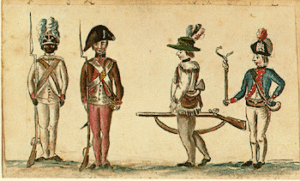
French sketch, yorktown-1781
On this date in 1775, the Continental Congress of the United States issued the order to bar Blacks from joining the army.
Many colonies had laws, ordinances, or resolutions excluding blacks from the local militias. George Washington, commander of the Continental Army, issued the government-enacted legislation in 1792 banning Blacks from duty in the state militias, which, for all practical purposes, eliminated them from service in the Army. From its beginning, the Marine Corps was prohibited by an act of Congress in 1798 from enlisting blacks.
No Blacks were enrolled in the Marines until August 1942, more than six months after the United States entered World War II. But during the Revolutionary War, the First Rhode Island Regiment in August of 1778, a nearly all-black unit comprised mainly of recently freed slaves, exhibited courage in battle, central to that era’s events.
Commanders of that day commended the unit for "deeds of desperate valor," and the First Rhode Island was referred to frequently by abolitionists in the 19th century.
The First Rhode Island has been largely forgotten in our day. When considering the American Revolution, it is important to understand that men fought for political and personal liberty.
Library of Congress
101 Independence Avenue S.E.
Washington D.C. 20540